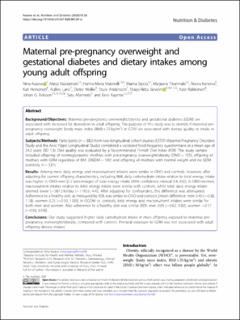| dc.description.abstract | Background/Objectives
Maternal pre-pregnancy overweight/obesity and gestational diabetes (GDM) are associated with increased fat deposition in adult offspring. The purpose of this study was to identify if maternal pre-pregnancy overweight (body mass index (BMI) ≥ 25 kg/m2) or GDM are associated with dietary quality or intake in adult offspring.
Subjects/Methods
Participants (n = 882) from two longitudinal cohort studies (ESTER Maternal Pregnancy Disorders Study and the Arvo Ylppö Longitudinal Study) completed a validated food-frequency questionnaire at a mean age of 24.2 years (SD 1.3). Diet quality was evaluated by a Recommended Finnish Diet Index (RDI). The study sample included offspring of normoglycaemic mothers with pre-pregnancy overweight/obesity (ONO = 155), offspring of mothers with GDM regardless of BMI (OGDM = 190) and offspring of mothers with normal weight and no GDM (controls; n = 537).
Results
Among men, daily energy and macronutrient intakes were similar in ONO and controls. However, after adjusting for current offspring characteristics, including BMI, daily carbohydrate intake relative to total energy intake was higher in ONO-men [2.2 percentages of total energy intake (95% confidence interval 0.4, 4.0)]. In ONO-women, macronutrient intakes relative to total energy intake were similar with controls, while total daily energy intake seemed lower [−587.2 kJ/day (−1192.0, 4.4)]. After adjusting for confounders, this difference was attenuated. Adherence to a healthy diet, as measured by RDI, was similar in ONO and controls [mean difference: men 0.40 (−0.38, 1.18); women 0.25 (−0.50, 1.00)]. In OGDM vs. controls, total energy and macronutrient intakes were similar for both men and women. Also adherence to a healthy diet was similar [RDI: men 0.09 (−0.62, 0.80); women −0.17 (−0.93, 0.59)].
Conclusions
Our study suggested higher daily carbohydrate intake in male offspring exposed to maternal pre-pregnancy overweight/obesity, compared with controls. Prenatal exposure to GDM was not associated with adult offspring dietary intakes. | en_US |

